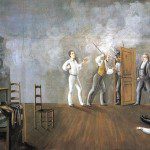With such strong allegations against Paula Deen, and in light of her own botched attempts at an apology, it’s hard to believe that anyone would not consider her decisions racist. In addition to using a racial slur which is itself a product of centuries of hatred and abuse against African Americans, Deen is condemned by the wedding she attempted to plan and a history of making racially insensitive remarks.
Yet, despite all the evidence of Deen’s racism, the majority of participants in a recent poll maintained that Deen is not, in fact, racist.
Those who defend Deen have maintained that she simply slipped up and shouldn’t lose her career for using one offensive word. Of course, there’s much more to the story than that. And perhaps telling a man that nobody could see him if he stood near a blackboard could be seen as a thoughtless remark. But it takes some strong racism to plan a plantation-style wedding that demeans black male waiters, in a tribute to slavery and Jim Crow era traditions.
So why do so many Americans insist on defending her?
When popular culture excuses deplorable behavior, it’s tempting to dismiss the reaction as ignorance, but I think there’s something deeper at play here. I don’t think very many Americans want to see Deen as racist. It’s the same issue that prevented reporters from recognizing the grave crime committed by the Steubenville rapists. After all, who wants to see a seventeen-year-old athlete as a rapist?
Learning that someone we love and admire has done something cruel can be terrifying. Perhaps we wonder if we’re guilty by association, if enjoying Chris Brown’s music is akin to supporting domestic violence, or if watching The Pianist means we’re supporting a rapist. And sometimes that question of guilt by association is so terrifying that we simply refuse to see the individual’s guilt.
But here’s why I think that fear is misplaced: it’s based on a false binary of good people and bad people. If we believe in that false binary, we believe that there are good people and then there are racist people, and so holding Paula Deen accountable for racist remarks seems like admitting that she’s a 100% bad person. That all her charisma and charm and any good work she’s done in her life cease to carry weight in the grand scheme of things.
And if we see the world through that binary, isn’t it hard to look at 17-year-old rapists and admit what they’ve done? Nobody wants to take someone so young and label them as evil.
So that false binary is precisely what we need to move away from. Moving away from this binary can be frightening. It’s frightening to admit that people who do cruel things have good in them too and that people who do good things also have moments when they say and do something cruel. It’s frightening because it means admitting that despite God’s promise that we’ll be able to tell good from evil, the tool of discernment is usually less like a GPS and more like a compass.
Using a compass takes practice.
And it’s frightening because it means accepting the truth when you learn that someone in your ward abuses their family, or when you learn that a famous church member is involved in a tax evasion scandal, or that the Church sometimes make cost-effective decisions that nevertheless hurt those it employs.
But seeing the nuance in people and organizations also means seeing the truth. It means learning to be flexible when winds of doubt or anger pummel you, so that you don’t break. And – perhaps best of all – it means finding beauty in even tragic circumstances.











